|
|
|
Sort Order |
|
|
|
Items / Page
|
|
|
|
|
|
|
| Srl | Item |
| 1 |
ID:
117641


|
|
|
|
|
| Publication |
2012.
|
| Summary/Abstract |
China, as host of the six-party talks first convened in August 2003, has
been one of the major players in dealing with the North Korean nuclear crisis that
began in October 2002. China's role in the talks has helped to start shaping a stable
regional security architecture in Northeast Asia. Beijing's leadership in building a
new security regime in the region suggests a change on Chinese perspectives regarding its role within the broader East Asia's regional security architecture. After years of
passiveness with regards to involvement in security regime building in the region,
China has evolved into an active leader seeking to shape a more institutionalized
security. Despite the obstacles to building a functioning regime in Northeast Asia,
China seems poised to continue working towards creation of a more stable and
institutionalized security architecture.
|
|
|
|
|
|
|
|
|
|
|
|
|
|
|
|
| 2 |
ID:
111523


|
|
|
| 3 |
ID:
107180


|
|
|
|
|
| Publication |
2011.
|
| Summary/Abstract |
This paper examines China's role in the Six-Party Talks, a multilateral initiative with the aim of denuclearising North Korea. As North Korea's behaviour has become increasingly provocative, evidenced by the Cheonan and Yeonpyeong Incidents and the newly unveiled uranium enrichment plant at Yeonbyon, China's indecision in dealing with the deteriorating situation has dramatically undermined Beijing's ability to continue successfully to play the leading mediator role. Yet if China fails to take decisive action now, the consequences could be dire. Further deterioration in North Korea's behaviour could trigger a nuclear arms race, severely hamper regional economic development and even create a geopolitical split in East Asia, leading to a confrontation between the US, South Korea and Japan acting together on one side, and China, Russia and North Korea aligned on the other. The factors that have prevented China from making further progress in the diplomatic process are many and various and this paper will reveal the complexity of the North Korean issue for China. Foreign academics and policy makers have tended to attribute China's indecision over North Korea to China putting its own security interests first. But this is far too simplistic a picture of the complex relationship that China has with North Korea. There are a host of factors at work that need to be taken into account to understand the present impasse in the diplomatic process. These factors include China's emotional ties to North Korea and empathy with its position as the weakest party in the Talks, the conflicting attitudes within the Chinese government itself towards the North, and the competing interests and lack of trust between the different stakeholders. It seems that for the foreseeable future, the North Korean issue will continue to plague Chinese foreign policy until all the parties involved act as a collaborative body to reach a consensus on how to resolve the situation.
|
|
|
|
|
|
|
|
|
|
|
|
|
|
|
|
| 4 |
ID:
114104
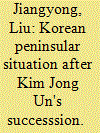

|
|
|
| 5 |
ID:
140585
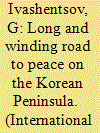

|
|
|
|
|
| Summary/Abstract |
SIXTY-FIVE YEARS AGO, on June 25, 1950, the first salvoes of the Korean War were fired - a war that lasted for over three years and has become one of the most bloody and devastating military conflicts of the latter half of the twentieth century. Its disastrous effects are still being felt today.
|
|
|
|
|
|
|
|
|
|
|
|
|
|
|
|
| 6 |
ID:
120347
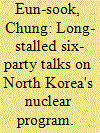

|
|
|
| 7 |
ID:
087646
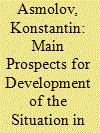

|
|
|
|
|
| Publication |
2009.
|
| Summary/Abstract |
Considering the possible escalation of the confrontation between the United States and an increasingly powerful China, the Korean Peninsula is of extraordinary importance to the Americans as a staging area, and demonized North Korea provides good grounds for an American military and political presence in the region. Recently, however, the lack of a unified US strategy on the North Korean issue has been apparent. This discord stems from the existence of several interest groups, each with its own point of view, in the United States.
To begin with these differences exist between those who, in the words of A. V. Vorontsov, may provisionally be called "pragmatists" and "messianics." The first group, as is clear from its sobriquet, favors a pragmatic approach to resolving the North Korean issue, and it believes that a rapid settlement on American terms would lower the level of possible tension, put an end to the "nuclear domino" trend so undesirable to Washington, and generally aid the growth of US prestige as an objective power capable of being an honest guarantor of international security
|
|
|
|
|
|
|
|
|
|
|
|
|
|
|
|
| 8 |
ID:
092721


|
|
|
| 9 |
ID:
092931


|
|
|
|
|
| Publication |
2009.
|
| Summary/Abstract |
For over half a century, the Korean Peninsula has posed a foreign-policy dilemma for every American president. During this time, continuity, rather than change, has been the prevailing characteristic of U.S. foreign policy. The recent Bush administration, in relation to its policy towards North Korea, was characterized by its dualism - believing in the same goal, but divided over goal achievement actions. Unfortunately, the internal division of policy at home has resulted in the North Korean nuclear issue being in a worse shape today than it was eight years ago after the Clinton-Bush regime change. After President Bush refused to follow Clinton's engagement path, North Korea significantly increased its plutonium stockpile, tested nuclear bombs and announced itself a "nuclear weapons state." President Barack Obama has inherited difficult issues and initiatives not only on the home front but also internationally. The new Obama administration is inundated with a plethora of policy issues ranging from economics to foreign policy. In the past few years, many experts in North Korean policy have juxtaposed various strategies that have been used and should be included with relation to North Korea. This paper will underline motives for North Korea's actions, updates of previously communicated policy options with real-time information, and offer a unique twist, with truths that are often overlooked, on how they should be implemented in the new Obama era, moving forward.
|
|
|
|
|
|
|
|
|
|
|
|
|
|
|
|
| 10 |
ID:
141771
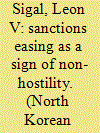

|
|
|
| 11 |
ID:
110794


|
|
|
|
|
| Publication |
2012.
|
| Summary/Abstract |
This paper discusses the national security challenges and policy dilemmas that
South Korea is predicted to face in the year 2012. North Korea is currently
engrossed in efforts for stabilization of its new regime led by Kim Jong Un. It is
expected that for the time being the two Koreas will seek signals to help facilitate
a shift in the bilateral situation amid the continuing tense situation. Meanwhile,
there remains a high possibility of recurrence of a crisis situation on the Korean
peninsula due to accumulated internal conflicts and the unproven leadership of
the North's new leader. Concerning the North's nuclear program, it is difficult to
expect it will be settled in the way intended at the time of launching the Six-Party
Talks. Under such circumstances, the international community's interest is
focused on what impact the new defense strategy adopted by the United States,
including the planned cuts in the U.S. defense budget over the next decade, will
have on the security situation in Northeast Asia. China's military buildup based
on its rapid economic development has become one of the main security concerns
for the countries in the region. The strategic dilemma associated with China's
military buildup looms large, particularly for South Korea, because the bilateral
relationship between the two Koreas overlaps with the ROK-U.S. alliance and the
relationship between South Korea and China. The best scenario would be if the
G-2, i.e. the United States and China, are willing to assume their share of responsibilities and capabilities in pending issues facing the international community, but
this could be wishful thinking. The importance of the ROK-U.S. alliance cannot be
overemphasized as long as U.S.-China relations remain one of "checking up on one
another" and confrontation, and there are continued threats from North Korea.
The South is certainly not alone in wishing to see China's development in diverse
sectors, i.e. raised GDP, the establishment of a competitive economic system, key
currency, global standards and military power, and increased responsibility and
capability for coping with security threats.
|
|
|
|
|
|
|
|
|
|
|
|
|
|
|
|
| 12 |
ID:
117667
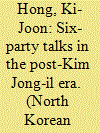

|
|
|
| 13 |
ID:
123107
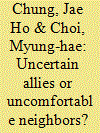

|
|
|
|
|
| Publication |
2013.
|
| Summary/Abstract |
This study is based upon two premises: (1) the available literature, though voluminous, fails to provide systematic understandings of the complex and evolving relations between China and North Korea; and (2) China and North Korea had been short of being trusted allies bound in blood and belief even before the launch of post-Mao reforms and the normalization of Beijing-Seoul relations. This article dissects this curious relationship into four questions: (1) What does history inform us about China's relations with (North) Korea? (2) Has China communicated effectively with North Korea? (3) Have China and North Korea been 'trusted allies'? (4) How effective has China been in inducing North Korea to comply with its demands over the years? The authors argue that, geo-strategically, China can hardly afford to put North Korea in an adversarial position. Furthermore, residues of the Factional Incident of 1956 and North Korea's deep-rooted suspicion of China still linger on. These have been the sources of Beijing's dilemma in consistently opting for 'soft' measures despite that North Korea's provocative acts and nuclear weapons programs have negatively affected China's interests. From the outset, China and North Korea had been more uncertain allies who had to cooperate with each other under the ideological and geopolitical imperatives of the difficult times. The authors also suggest that it would be misleading to put Sino-North Korean dynamics in a usual category of big power-small nation relations where power asymmetry generally works against the latter. North Korea has undoubtedly been an atypical 'small nation'. It is due to these limitations that China's pressurizing has not been always effective and that Beijing's reactions have been continuously cyclical. This cyclical trend is not likely to be broken since the upcoming drama of Sino-American rivalry is bound to close the window of such opportunities for China, which will nevertheless regard North Korea increasingly as a liability, if not uncomfortable neighbor.
|
|
|
|
|
|
|
|
|
|
|
|
|
|
|
|
|
|
|
|
|